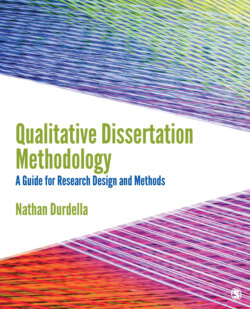Читать книгу Qualitative Dissertation Methodology - Nathan Durdella - Страница 46
На сайте Литреса книга снята с продажи.
Historical contexts of dissertations.
ОглавлениеThe cultural meaning that faculty ascribe to scholarly research has shaped their orientation to dissertation research in terminal degree programs in the United States. As a culminating experience, the dissertation emerged in Medieval Europe as a mechanism for faculty to engage students in an academic ritual that served to train and prepare students for the rigors of their own work. The formal requirements for written research dissertations developed as early as the late 1700s in German universities (Barton, 2005). With the advent of book publishing and a reliable mail system, mechanisms to record, disseminate, and store written texts in Medieval Europe changed how fast information could be shared (Barton). Indeed, faculty at German universities initiated student requirements for written research in the form of a dissertation. The specific forces in German universities that facilitated the development of a model of graduate student research in the form of a dissertation study can be attributed to both academic freedom and scholarly research. Hofstadster and Metzger (1955) argue that the values of academic research and the freedom to teach and learn moved academics in German universities to promote research production as a key benchmark of faculty work.
The historical origins of dissertations as a central experience for students in advanced degree programs in the United States can be traced to American graduate student study abroad experiences in German universities and the migration of German academics to U.S. universities in the 1800s (Malone, 1981). As a general pattern, prominent American students who studied in German universities, earning Ph.D. degrees, returned to U.S. universities to implement the German model of graduate student research and the dissertation as a culminating experience in terminal degree programs (Lucas, 2006). While in dispute about the specific course of study in a terminal degree program, Yale University appears to be the first U.S. university to offer Ph.D. degrees in 1860, and Johns Hopkins is the first U.S. institution of higher education to be founded on the German research model (Malone). Through the 1800s to today, universities in Europe and the United States have continued to use dissertations as a major program requirement and culminating experience for doctoral education (Parsons, 1989).
The scholarly production apparatus and focus on empirical research that characterized early U.S. university faculty practices continue today. With a range of institutional missions and doctoral program areas of focus—research versus applied research emphasis, research-scholar versus scholar-practitioner dispositions—culminating activities in doctoral programs vary and may take forms ranging from a book-length research dissertation to applied research dissertations to a series of research and/or practice projects. While doctoral program requirements differ and new approaches to dissertation research projects have emerged, doctoral program faculty have largely retained dissertation research as a distinguishing characteristic of terminal degree study in graduate education. The place of dissertations as the most prominent component of doctoral programs (Malone, 1981) remains today and requires faculty to commit time and resources to promoting a coherent, meaningful dissertation research context for graduate students.
